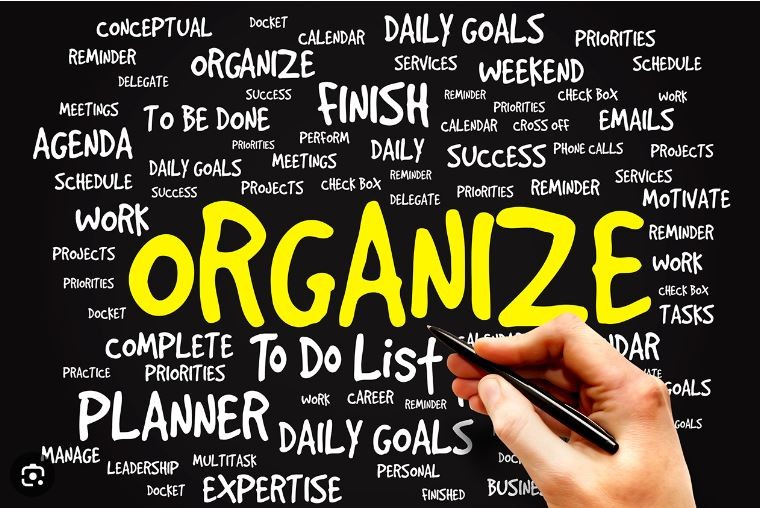Staying organized is essential for maintaining productivity, reducing stress, and creating an environment that promotes well-being. Whether at home or work, organization helps you manage tasks efficiently, keeps your space clean and functional, and enables you to prioritize what truly matters. However, organizing your personal and professional life is no small feat—especially if you juggle multiple responsibilities.
In this article, we’ll explore some of the best strategies for staying organized at home and work, offering practical tips that you can easily implement to achieve a more streamlined, stress-free routine.
1. Set Clear Goals and Priorities
At both home and work, it’s important to know what you need to accomplish before diving into tasks. Setting clear goals helps you stay focused and ensures that you’re working towards something meaningful.
How to Set Goals:
- Break Large Tasks Into Smaller Steps: Whether it’s organizing your home or completing a big project at work, break tasks down into smaller, manageable steps. This helps reduce overwhelm and gives you a clear roadmap for completing them.
- Use the SMART Goal Framework: When setting goals, make them Specific, Measurable, Achievable, Relevant, and Time-bound. This structure provides clarity and helps keep you accountable.
- Prioritize: After listing your tasks, prioritize them by importance and urgency. Tackle high-priority items first and leave less pressing tasks for later. Consider using tools like the Eisenhower Matrix to determine your priorities.
Why It’s Effective:
- Prevents Procrastination: Knowing exactly what you need to accomplish and in what order helps you stay on track.
- Increases Focus: Having clear goals and priorities allows you to focus on the task at hand rather than feeling distracted by everything else on your to-do list.
2. Declutter Your Space Regularly
A cluttered space can be overwhelming and make it difficult to focus, whether at home or at work. Regular decluttering is essential to maintain a clean and organized environment.
Decluttering Tips:
- Adopt the “One-In, One-Out” Rule: For every new item you bring into your home or workspace, get rid of one item. This will help prevent unnecessary accumulation.
- Sort and Purge: Set aside time each week or month to go through your belongings and get rid of items you no longer need or use. Consider donating or selling things that are still in good condition.
- Create a Cleaning Routine: Develop a daily or weekly cleaning routine to keep your space tidy. Doing small tasks like putting away dishes, wiping down surfaces, or organizing papers on a regular basis prevents clutter from building up.
Why It’s Effective:
- Increases Productivity: A clutter-free space helps your mind stay focused on the tasks that matter most.
- Reduces Stress: Clutter can cause mental clutter. By keeping your environment tidy, you create a calming atmosphere that reduces stress and anxiety.
3. Use Digital and Physical Tools to Stay Organized
Utilizing both digital tools and physical systems can help you stay on top of tasks at home and work. Combining the two ensures you have the flexibility to manage your day in ways that suit your preferences.
Tools for Staying Organized:
- Calendars: Use digital calendars (e.g., Google Calendar, Outlook) to schedule meetings, appointments, and personal events. This ensures you stay on top of deadlines and commitments.
- Task Management Apps: Tools like Todoist, Trello, or Asana help you break tasks into projects and assign deadlines. These apps also allow you to collaborate with others on work projects.
- Paper Systems: For those who prefer physical organization, use planners, notebooks, or filing systems to keep track of tasks, appointments, and ideas. Color-coded systems can also help with organizing papers at work or home.
Why It’s Effective:
- Ensures Nothing Falls Through the Cracks: A task management system helps you track every item on your to-do list and ensures deadlines are met.
- Keeps You On Schedule: A digital calendar or planner lets you quickly check your schedule and stay on top of appointments and events.
- Offers Flexibility: Combining digital tools and physical systems allows you to use whichever method is most comfortable for you at any given moment.
4. Create Daily and Weekly Routines
Routines bring structure to your day and help you stay organized without needing to think about what comes next. Creating both daily and weekly routines can improve your efficiency and create good habits.
Daily Routine Tips:
- Set Morning and Evening Rituals: Start your day with a routine that helps you feel organized and focused. This could include making your bed, preparing your meals, or reviewing your goals for the day. Similarly, create an evening routine that allows you to wind down and prepare for the next day.
- Time Block: Allocate specific times for different tasks (e.g., check emails from 9-10 AM, work on a report from 10-12 PM). Time blocking helps you focus on one task at a time and ensures you’re using your time efficiently.
Weekly Routine Tips:
- Set Weekly Goals: At the start of each week, list your goals and tasks for both work and home. Review your calendar, identify your priorities, and break down large tasks into smaller steps.
- Weekly Clean-Up and Organization: Dedicate time each week to declutter and tidy up. You could use Sunday evenings to clean up your workspace and home, review your finances, or prep meals for the upcoming week.
Why It’s Effective:
- Increases Consistency: Having a set routine reduces decision fatigue and helps you stay on track.
- Boosts Productivity: Time blocking and setting weekly goals make it easier to focus on what needs to get done.
5. Delegate and Outsource Tasks
At both home and work, there will be times when you cannot do everything yourself. Delegating tasks to others or outsourcing certain responsibilities can help you stay organized and maintain focus on higher-priority items.
How to Delegate Effectively:
- At Work: Share tasks with colleagues or team members, especially if someone else has more expertise or capacity to handle them. Use collaboration tools like Slack or Microsoft Teams to assign and track tasks.
- At Home: Delegate household chores to family members, roommates, or hire help if possible. For example, consider using a cleaning service, or if you have kids, assign them age-appropriate chores to share the load.
Why It’s Effective:
- Prevents Overwhelm: Delegating tasks allows you to avoid becoming overloaded with work and home responsibilities.
- Maximizes Time: By delegating or outsourcing, you free up time to focus on tasks that align with your goals or require your specific expertise.
6. Create Clear Systems for Paperwork and Documents
Disorganized paperwork is a common issue that leads to clutter, stress, and missed deadlines. Setting up systems for organizing both physical and digital documents will help you stay on top of your responsibilities.
Paperwork Organization Tips:
- Go Paperless: Whenever possible, transition to digital documents to reduce the amount of physical paperwork. Store your documents in organized folders on your computer or use cloud services like Google Drive or Dropbox.
- Create Filing Systems: For important physical documents, set up a filing system that works for you. Use labeled folders or filing cabinets to categorize documents such as bills, contracts, and receipts.
- Shred Unnecessary Papers: Regularly go through your physical documents and shred items you no longer need. This prevents unnecessary clutter from building up.
Why It’s Effective:
- Reduces Clutter: Having a clear filing system prevents papers from piling up and overwhelming your space.
- Improves Efficiency: A streamlined system makes it easy to find important documents when needed, reducing time spent searching for papers.
7. Minimize Distractions
Both at home and at work, distractions can significantly impact your productivity. Limiting distractions and creating focused work environments will help you stay organized and get things done.
Tips for Reducing Distractions:
- Set Boundaries: At home, set specific work hours if you’re working remotely, and let others know when you’re not to be disturbed. Similarly, at work, avoid unnecessary meetings or notifications that could derail your focus.
- Limit Digital Distractions: Turn off social media notifications, use apps like Focus@Will to stay focused, or block distracting websites using tools like Freedom or Cold Turkey.
- Designate Specific Spaces: At home, create a specific area for work or tasks, which helps create a mental boundary between your work and personal life.
Why It’s Effective:
- Improves Focus: By limiting distractions, you can concentrate better and get more done in less time.
- Boosts Productivity: Reducing interruptions allows you to complete tasks more efficiently, helping you stay on top of your goals.
8. Review and Adjust Your Systems Regularly
Organization is not a one-time task—it requires ongoing effort and adjustments. Periodically reviewing and refining your systems will ensure that they continue to work for you and meet your evolving needs.
How to Review and Adjust:
- Weekly or Monthly Check-Ins: Take time to assess how well your organization strategies are working. Are you meeting your goals? Is your workspace still efficient? Are there new tools or strategies you could incorporate?
- Adapt as Your Needs Change: As your life and responsibilities evolve, your organization systems should adapt. For example, if your work schedule changes, you may need to adjust your daily routine or if you move homes, you may need to reconfigure your space.
Why It’s Effective:
- Ensures Long-Term Success: Regularly reviewing your systems helps you spot areas for improvement, making your organization efforts more sustainable.
- Keeps You Flexible: By adapting to changes, you stay organized and resilient in the face of new challenges.
Conclusion
Staying organized at home and work is an ongoing process, but with the right strategies, it can lead to significant improvements in productivity, mental clarity, and overall well-being. By setting clear goals, decluttering regularly, using effective tools, creating routines, delegating tasks, minimizing distractions, and reviewing your systems, you can maintain an organized life that supports your personal and professional growth. Remember, the key to successful organization is consistency—make small adjustments over time, and you’ll soon reap the benefits of a well-organized life.

